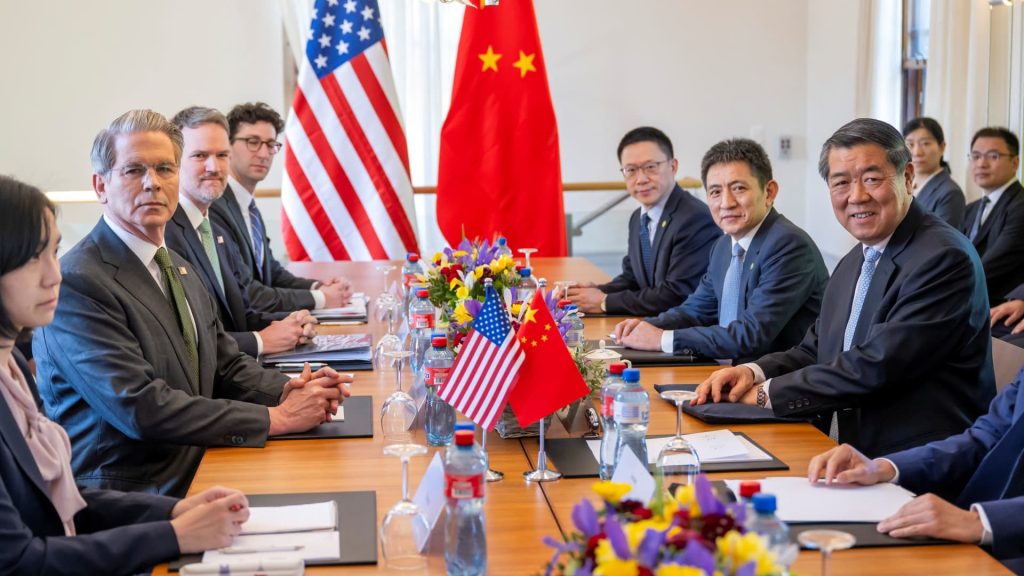In a critical development regarding U.S.-China trade relations, Treasury Secretary Scott Bessent and two other key administration officials are set to engage in renewed trade negotiations with their Chinese counterparts in London. President Donald Trump announced the meeting, which aims to address various ongoing disputes amidst a complicated and protracted trade war. This meeting follows a recent phone call between Trump and Chinese President Xi Jinping where issues of mutual concern were discussed.
| Article Subheadings |
|---|
| 1) Meeting Details and Participants |
| 2) Background of U.S.-China Trade Relations |
| 3) Recent Developments Leading to the Meeting |
| 4) Stakeholder Responses |
| 5) Future Implications of the Talks |
Meeting Details and Participants
The forthcoming trade talks will take place in London, a neutral ground for both U.S. and Chinese officials, on an unspecified date soon. Accompanying Secretary Bessent will be Commerce Secretary Howard Lutnick and U.S. Trade Representative Jamieson Greer. These individuals are pivotal in shaping trade policies and negotiations with China. President Trump expressed optimism about the talks on the social media platform Truth Social, emphasizing that they “should go very well.” This sentiment highlights the administration’s desire for successful dialogue amidst ongoing disputes.
Background of U.S.-China Trade Relations
U.S.-China trade relations have long been a roller coaster of cooperation and conflict. Historically, these two economic superpowers have engaged in trade negotiations amid a backdrop of rapidly evolving global markets. The trade relationship saw significant disruptions with the imposition of tariffs and various trade barriers as the two nations jostled for economic power. As of last year, bilateral trade exceeded $582 billion, indicating the importance of this relationship for both economies. However, repeated accusations and retaliatory measures have complicated their interactions, resulting in increased tension and uncertainty.
Recent Developments Leading to the Meeting
The announcement of this latest round of trade talks comes in the wake of a significant phone call that President Trump had with President Xi Jinping. During this conversation, both leaders discussed pressing issues that have arisen since previous negotiations. Notably, recent trade talk progress made in Geneva appeared promising when both nations had agreed to reduce tariffs temporarily. Yet, following that, China accused the U.S. of backtracking on commitment by suggesting restrictions on the use of semiconductors from China. Moreover, the U.S. administration had publicly announced plans to revoke visas for certain Chinese students, indicating an increase in tension and suspicion.
Stakeholder Responses
The responses from both countries to the trade discussions have been varied but often critical.
“There should no longer be any questions respecting the complexity of Rare Earth products,”
remarked Trump after his call with Xi, highlighting the pivotal topic of rare earth minerals in future negotiations. The Chinese government has displayed frustration, claiming U.S. actions undermine previously made agreements. This tension showcases the delicate balance both nations must maintain, as negative sentiments could derail potential agreements. Moreover, stakeholders in various industries are closely monitoring these discussions, recognizing the far-reaching implications of the outcomes on international trade dynamics.
Future Implications of the Talks
As the upcoming negotiations unfold, the results may have profound implications for global trade dynamics. Success in negotiations may ease tensions and pave the way for further collaboration between the U.S. and China. Conversely, failure to reach satisfactory agreements could exacerbate the existing trade war, affecting economies worldwide. Businesses relying on both countries for trade may experience disruptions that could complicate their operations and supply chains. Economic analysts are keenly observing how the talks will shape not only U.S.-China relations but also the broader international trade landscape.
| No. | Key Points |
|---|---|
| 1 | Trade talks between U.S. and China are set to occur in London. |
| 2 | Key U.S. officials involved include Treasury Secretary Scott Bessent, Commerce Secretary Howard Lutnick, and U.S. Trade Representative Jamieson Greer. |
| 3 | The trade relationship between the U.S. and China has been marked by disputes and tariffs. |
| 4 | The upcoming meeting follows a phone call between President Trump and President Xi Jinping. |
| 5 | The outcome of these talks could have significant implications for global trade dynamics. |
Summary
The scheduled meeting between U.S. officials and their Chinese counterparts underscores the complexities inherent in U.S.-China trade relations. As tensions rise amidst an ongoing trade war, the importance of effective communication and successful negotiations cannot be overstated. The outcomes of the discussions will not only influence future bilateral relations but will also send ripples across the global economic landscape, affecting businesses and consumers worldwide.
Frequently Asked Questions
Question: What are the main objectives of the upcoming trade talks?
The primary goal is to address ongoing disputes while seeking to reestablish a cooperative trade relationship between the U.S. and China.
Question: Why is the trade relationship between the U.S. and China so significant?
The U.S. and China are the two largest economies in the world, and their trade relationship impacts global markets, supply chains, and economic policies.
Question: What specific issues are likely to be raised during the talks?
Key topics include tariffs, rare earth minerals, and recent restrictions on technology and educational exchanges between the two nations.
